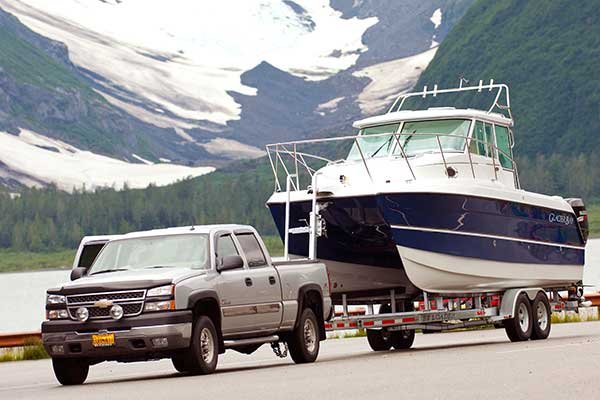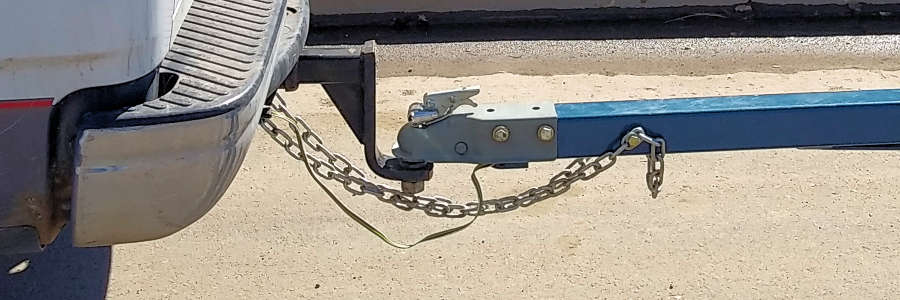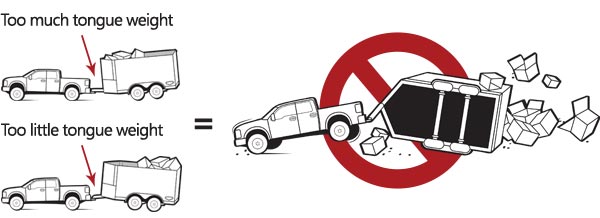Rigging Right for Trailering

The other day I started thinking about all the trailer towing I have done over the years and what I have learned. If it has happened, it has happened to me including my trailer going in its own direction. So, I thought I would pass on some of my knowledge and experiences.
Just remember all hitches are not created equal. The larger hitches with the square hole/receiver are generally rated for more towing ability. If you are unsure go to a place where they know hitches to see if you have a hitch with the right towing capacity.
The most common hitches come in classes like Class I, II & III. With any type of boat towing, you are going to want at least a Class III or more. Class III is rated for about 7500lbs of tow weight, so make sure you know your trailer and boat weight. The hitch (part that slides into the receiver) needs to be rated as well for your load capacity.
Going hand and hand with all this is the ball. I always thought a ball was a ball and they worked for everything. Well, I was wrong about that too. Like hitches they have weight rating and come in different sizes as well. The rating is usually stamped on the top of the ball.
If your ball has no stamp on it is probably too old and needs to be retired. Whether it chrome plated or painted it doesn’t matter, as long as it has the right rating for the towing you are doing. A little grease on the ball for a long tow is a good idea; just remember to give it a wipe after so you won’t get it on your clothing after; that seems to always be the case with me.
Chains

Safety chains are something else that for the most part get neglected as your trailer gets older. They in many cases sit out and rust as well as drag on the ground once in a while, which all results in wear. I did have a trailer pop off the ball once and the chains saved the day and a costly repair to the rear of my truck.
Like everything else they too have a rating and that goes for the way they are attached to the trailer and whether you use hooks or chain loops fasten the chains to the hitch. Light trailers will sometimes just have one chain – I prefer two. Never travel without them; trust me I know.
Tongue Weight

Getting on to the vehicle, one must be aware of the tongue weight of the vehicle. I once had a Jeep Liberty that had a 500lb tongue weight allowing me plenty of towing options. My present truck only has a 250lb tongue weight, which is pretty common. If you need more you are going to need better rear springs to handle the extra load.
A spring shop will help you with those choices. I learned that one the hard way as well when a heavy trailer broke a few springs and the truck was a little lopsided. So, if you buy a used truck have it checked buy a spring shop or the dealer or both for the right springs you may need to tow properly and safely.
Towing puts a load on your transmission causing it to overheat. To handle the extra strain on your transmission an auxiliary transmission cooler can be installed. Transmissions are expensive to rebuild. One other tip here is that if you do a lot of towing a transmission flush, should be done more often. A friend who carried and towed frequently flushed his yearly and got 450,000-miles before a transmission rebuild.
Brakes
If you find your brakes are just not up to the job of stopping your vehicle and trailer better brakes might be the answer. Checking the trailer brakes as well if your trailer has them. Besides talking to a dealer about your brakes, some of the speed shops offer better calipers and better rotors that will offer better superior braking power.
One last thing I need to mention is trailer security. Recently someone I know had their trailer stolen. Yes, it does happen more than you think but the worst thing about it was that it wasn’t insured. It was a tough lesson to learn and even a tougher time with his wife. I have seen people remove the rimes or chain the wheels together (both sides).
There are all kinds of suggestions here, but my best advice is a trailer out of site and secured and checked on is the best way to keep your trailer yours.